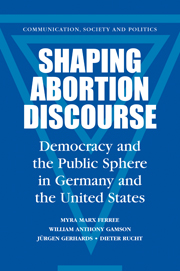Book contents
- Frontmatter
- Contents
- Tables and Figures
- Foreword by Friedhelm Neidhardt
- Preface
- Glossary
- Part I Introduction
- Part II Major Outcomes
- 4 The Discursive Opportunity Structure
- 5 Standing
- 6 Framing
- Part III Representing Different Constituencies
- Part IV The Quality of Abortion Discourse
- Methodological Appendix
- References
- Index
5 - Standing
Published online by Cambridge University Press: 15 December 2009
- Frontmatter
- Contents
- Tables and Figures
- Foreword by Friedhelm Neidhardt
- Preface
- Glossary
- Part I Introduction
- Part II Major Outcomes
- 4 The Discursive Opportunity Structure
- 5 Standing
- 6 Framing
- Part III Representing Different Constituencies
- Part IV The Quality of Abortion Discourse
- Methodological Appendix
- References
- Index
Summary
Not every actor has an equal chance to have a voice in public discourse. Not only are some actors better prepared and motivated to speak out on a particular topic, but the customary practices of news gathering make some speakers highly salient to the media while others are less so. By standing, we mean having a voice in the media.
The concept comes from legal discourse, where it refers to the right of a person or group to challenge in a judicial forum the conduct of another. Rather than a matter of clear definition, legal standing is a battleground. By analogy, media standing is also contested terrain. In news accounts, it refers to gaining the status of a media source whose interpretations are directly or indirectly quoted.
Standing is not the same as being covered or mentioned in the news; a group may be in the news in the sense that it is described or criticized but has no opportunity to provide interpretation and meaning to the events in which it is involved. Standing refers to a group being treated as an agent, not merely as an object being discussed by others.
From the standpoint of most journalists who are attempting to be “objective,” the granting of standing is anything but arbitrary. Sources are selected, in this view, because they speak as or for serious players in any given policy domain: individuals or groups who have enough political power to make a potential difference in what happens. Most journalists would insist that their choice of sources to quote has nothing at all to do with their personal attitudes toward those sources.
Information
- Type
- Chapter
- Information
- Shaping Abortion DiscourseDemocracy and the Public Sphere in Germany and the United States, pp. 86 - 104Publisher: Cambridge University PressPrint publication year: 2002
